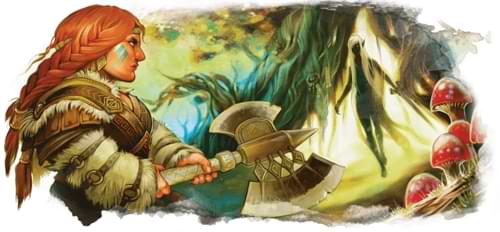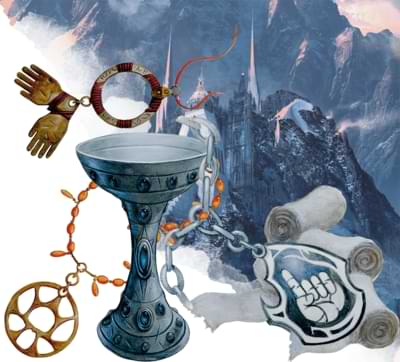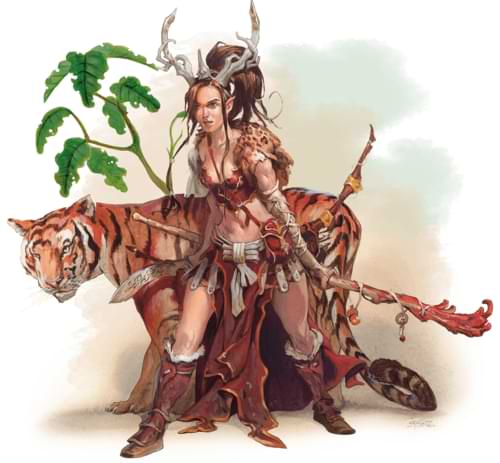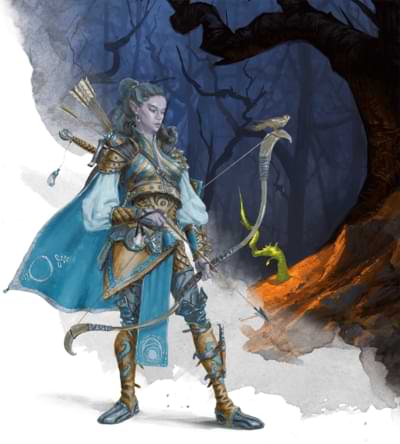Welcome to Dungeons & Dragons, a roleplaying game where you'll create a hero to play as in adventures!
One of the first things you'll want to consider when creating a character is what class they will be. In D&D, your class helps determine your character’s role within an adventuring party. Each class has unique features that can affect how they interact with the world. Barbarians are tanky melee combatants that can dish out big damage, while druids are nature-loving spellcasters who can turn into animals and control the battlefield.
Below, you’ll find a quick overview of each class available to you, along with pros and cons to help you decide. Once you’ve chosen your favorite, you can bring them to life using the D&D Beyond Character Builder—most of these classes are available for free in the D&D Beyond Basic Rules and Player’s Handbook!
Select a class to learn about it |
|
| Barbarian | Ranger |
| Bard | Rogue |
| Cleric | Sorcerer |
| Druid | Warlock |
| Fighter | Wizard |
| Monk | Artificer* |
| Paladin | |
| * Available in Tasha’s Cauldron of Everything. | |
Start playing with D&D Beyond
D&D Beyond is an official digital toolset to play Dungeons & Dragons. Signing up is free and gets you access to the Character Builder and character sheets with integrated dice rolling. Our marketplace has the official D&D books for sale, as well.
As you grow your collection and learn the game, you can subscribe to D&D Beyond to create an unlimited number of characters, access tools that make running the game easier, and save your gaming group money by sharing your books (requires a Master-tier subscription).
Barbarian

The barbarian is the perfect class for those who like to run into the midst of danger and start swinging away at enemies to deal big damage. They have access to Rage, which allows them to deal additional damage with melee attacks while also taking reduced damage from common sources of damage. They are a relatively straightforward, hack-and-slash class, making them great for new D&D players.
| Pros | Cons |
|
|
Learn more: Barbarian 101: A Beginner’s Guide to Relentless Fury
Bard
Bards use the arts to fuel their magic and to support allies on the battlefield. Thanks to their Jack of All Trades feature, they can be good at just about any ability check you'll need to make. Their spell selection is limited until you get Magical Secrets, which lets you learn two spells from any class. Overall, the bard is great if you like helping your friends succeed in and out of combat and enjoy talking up non-player characters (NPCs).
| Pros | Cons |
|
|
Next up: Bard 101: A Beginner’s Guide to Guile and Panache
Cleric
 Don't overlook the cleric. Although they make incredible healers, they have a flexible spell list and a wide range of subclasses that allow them to take on just about any role in an adventuring party. Want to destroy enemies with a warhammer, heal and buff your allies, or just fire off destructive spells from afar? The cleric can make it happen.
Don't overlook the cleric. Although they make incredible healers, they have a flexible spell list and a wide range of subclasses that allow them to take on just about any role in an adventuring party. Want to destroy enemies with a warhammer, heal and buff your allies, or just fire off destructive spells from afar? The cleric can make it happen.
| Pros | Cons |
|
|
See: Cleric 101: A Beginner’s Guide to Playing the Divine
Druid

Druids draw their magic from nature itself, and have great options for character creation. You can base your entire build around Wild Shape, which lets you transform into beasts; you can play support and heal allies well; or you can focus on battlefield control by casting spells like entangle.
One of the greatest drawbacks to this class is that you're going to need to keep track of your spells and the statistics of your Wild Shape forms and creatures you summon. Fail to do so, and you could bog down the flow of the game.
| Pros | Cons |
|
|
Read: Druid 101: A Beginner’s Guide to Channeling Nature’s Might
Fighter
There's two main reasons why the fighter is one of the most popular classes in Dungeons & Dragons: they're easy to pick up and they're effective. Your selection of subclasses in the Player’s Handbook allow you to create the warring legend of your dreams — be a mounted knight, a deadly bowman, a warrior-caster hybrid, or something else.
| Pros | Cons |
|
|
Check out: Fighter 101: A Beginner’s Guide to Heroic Combat
Monk
Monk is the perfect class for those looking to channel their inner martial arts master. They use Ki points to gain additional attacks through Flurry of Blows, additional movement speed through Step of the Wind, and more. They have great combat utility and maneuverability. Their iconic feature is Stunning Strike, which allows you to stun enemies.
| Pros | Cons |
|
|
See: Monk 101: A Beginner’s Guide to Mystical Combat
Paladin
Paladins are warriors who are oath-bound, often to a divine cause. They are tanky combatants who bring the hurt to foes with their iconic Divine Smite feature, which lets you add damage to your attacks by burning spell slots. The class also offers some healing via Lay on Hands. Paladins are like a midway point between a fighter and a cleric, and are great for players who want to don heavy armor, have big swings in damage, and provide a bit of aid to allies.
| Pros | Cons |
|
|
Check out: Paladin 101: A Beginner’s Guide to Divine Justice
Ranger
 Rangers are adept warriors skilled at traveling through the wilderness. They stalk and hunt down their enemies, and have features that allow them to safely navigate otherwise dangerous regions. They get some spells, and these assist them in taking down enemies or just making friends with creatures. While most players might imagine a ranger as someone who fires down on their enemies with a bow, the ranger can also get up close and personal.
Rangers are adept warriors skilled at traveling through the wilderness. They stalk and hunt down their enemies, and have features that allow them to safely navigate otherwise dangerous regions. They get some spells, and these assist them in taking down enemies or just making friends with creatures. While most players might imagine a ranger as someone who fires down on their enemies with a bow, the ranger can also get up close and personal.
| Pros | Cons |
|
|
Original vs. revised ranger
To many, the base version of the ranger class in the Player’s Handbook is lackluster. The class-defining features are situational and might not be useful depending on your Dungeon Master's style. The ranger class saw a rework in the form of optional features in Tasha’s Cauldron of Everything. I highly recommend checking out these optional features before locking in a ranger.
Learn more: Ranger 101: A Beginner’s Guide to Exploring the Wilderness
Rogue
The rogue is the premiere stealth class in Dungeons & Dragons. The Sneak Attack feature allows you to deal massive amounts of damage, and Cunning Action allows you to take the Dash, Disengage, or Hide action as a bonus action, giving you a lot of maneuverability in combat. If you like sneaking around, picking locks, stealing treasure, and assassinating your enemies, rogue is the class for you.
| Pros | Cons |
|
|
Next up: Rogue 101: A Beginner’s Guide to Stealth and Subterfuge
Sorcerer
Sorcerers are characters whose magic comes naturally to them. In most cases, a sorcerer's bloodline is intertwined with some greater entity, like a celestial being or fiend. They get a limited number of spells but can modify them using their defining feature, Metamagic. This class feature allows them to tweak spells in various ways, including increasing their range, making them hard to detect, or simply giving them more oomph. They use Metamagic by using sorcery points.
| Pros | Cons |
|
|
Learn more: Sorcerer 101: A Beginner’s Guide to Innate Magic
Warlock
By making a deal with an otherworldly entity, warlocks gain the privilege of using magic. Whether the entity is benevolent or sinister, creating a warlock allows players to fulfill a “deal with the devil”-type of character. They get access to unique spells only they can learn. This includes eldritch blast, the best damaging cantrip in the game. Eldritch invocations also let you customize your character to great effect.
| Pros | Cons |
|
|
Read: Warlock 101: A Beginner’s Guide to Eldritch Might
Wizard
Wizards are the iconic spell-slingers of Dungeons & Dragons. They have the biggest selection of spells available and have numerous specializations that allow them to either focus on one of the particular schools of magic, or a particular facet of spellcasting. WIth a huge array of spells, and a great variety of subclasses, wizards are one the most flexible and most advanced classes in the game.
| Pros | Cons |
|
|
Check out: Wizard 101: A Beginner’s Guide to the Arcane Arts
Artificer
The newest class in the game is the artificer. This class is perfect for those who enjoy crafting. Artificers have the ability to infuse items with magical properties, as well as create their own set of magical items. To supplement this, they have access to a limited selection of spells and subclasses that allow you take on any role you please, whether that's a damage dealer or support character.
Available in Tasha's Cauldron of Everything
The artificer does not appear in the Player's Handbook. It was originally added to the game in Eberron: Rising From the Last War and was later reprinted, along with the Armorer subclass, in Tasha’s Cauldron of Everything.
| Pros | Cons |
|
|
Read: Artificer 101: A Beginner’s Guide to Making Magical Marvels
Create your character
You've done your research, now it's time to start creating your character! If you need a little extra help, this video shows you how to quickly make a character using D&D Beyond's character builder:
Bryce Miller-Booker (@BMillerBooker) is English Language Arts graduate from San Diego State University. He is a writer with a love of all things geek, including video games, anime, trading card games, esports, and reading. He has a particular interest in social geek events such as local competitions for the various trading card or video games he is playing as well as tabletop games like Dungeons & Dragons. The greatest loves in his life are good food and his pet dog and partner in crime, Zero.








-
View User Profile
-
Send Message
Posted Dec 1, 2022You forgot the sorcerer, but I like this summary.
-
View User Profile
-
Send Message
Posted May 8, 20238 ruj
-
View User Profile
-
Send Message
Posted May 8, 2023-
View User Profile
-
Send Message
Posted Jul 2, 2023You forgot to mention the sorcerers....
-
View User Profile
-
Send Message
Posted Aug 20, 2023to be honest as a newbie myself i found this pretty helpful i tend to have a hard time telling what the disadvantages to being a certain class is sometimes and it really helped my ADHD brain understand what some of the downsides are.
-
View User Profile
-
Send Message
Posted Aug 29, 2023Definitely
-
View User Profile
-
Send Message
Posted Sep 2, 2023https://www.dndbeyond.com/campaigns/join/4473280886780431 campaign i wanna play with someone
-
View User Profile
-
Send Message
Posted Jan 3, 2024Oathbreaker Paladin ftw
-
View User Profile
-
Send Message
Posted Feb 2, 2024I think the Rouge is overpowered
-
View User Profile
-
Send Message
Posted Mar 15, 2024Are there gonna be new classes to choose from?
-
View User Profile
-
Send Message
Posted Mar 18, 2024At the moment, I do not think so, but a defining characteristic of classes is that each has multitude of subclasses, essentially specializations that further define the character. As an example, 2 of rogue’s subclasses would be an arcane trickster, a magical trickery type rogue, and assassin, a stealthy, murderous rogue. They add new subclasses all the time. On top of that, there are homebrewers that create custom classes, races and spells all the time.
-
View User Profile
-
Send Message
Posted Mar 18, 2024Rogue is good but frontloaded. They aren’t especially great against a lot of enemies, and their late game abilities have a lot less impact than other classes late game abilities. Makes them amazing for multiclassing though
-
View User Profile
-
Send Message
Posted Jun 26, 2024I checked it out and its good
-
View User Profile
-
Send Message
Posted Aug 19, 2024Amazing post! A great way to introduce new players and help then to choose witch class they want to play!
-
View User Profile
-
Send Message
Posted Aug 31, 2024You mean Jocat i watch him.
-
View User Profile
-
Send Message
Posted Sep 12, 2024yeah but I like drake warden too
-
View User Profile
-
Send Message
Posted Oct 16, 2025I sthe ranger from Tasha's cauldron of evertythong reworked into the 2024 ranger? I Played a wizard half-lef from 2014 and the changed it to be a 2024 wizard elf, but a have a player playing from the first time a 2024 ranger and we dont have the tahas's book, so I don't know the differences between them ( ranger 2014/tahas/ 2024)
-
View User Profile
-
Send Message
Posted Jan 2, 2026I just see that you didn't mention multiclassing. Ypu have some really good examples like a assasin rouge that made a deal with a fey. You also didn't mention that eldritch knights are one of the best tanks in the game(because of the shield spell and all the armour).
Overall this here gave me an idea for a new campaign, so thank you!